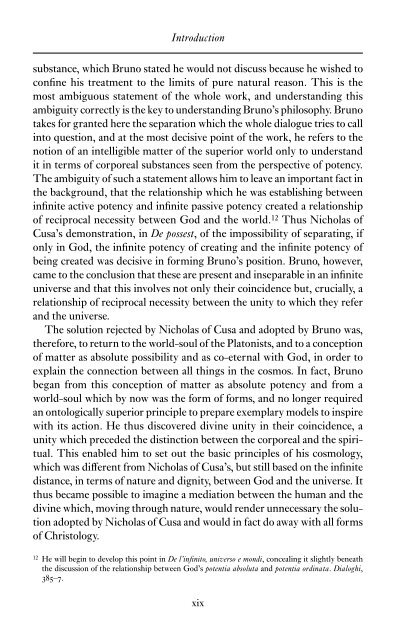Create successful ePaper yourself
Turn your PDF publications into a flip-book with our unique Google optimized e-Paper software.
Introduction<br />
substance, which Bruno stated he would not discuss because he wished to<br />
confine his treatment to the limits of pure natural reason. This is the<br />
most ambiguous statement of the whole work, and understanding this<br />
ambiguity correctly is the key to understanding Bruno’s philosophy. Bruno<br />
takes for granted here the separation which the whole dialogue tries to call<br />
into question, and at the most decisive point of the work, he refers to the<br />
notion of an intelligible matter of the superior world only to understand<br />
it in terms of corporeal substances seen from the perspective of potency.<br />
The ambiguity of such a statement allows him to leave an important fact in<br />
the background, that the relationship which he was establishing between<br />
infinite active potency and infinite passive potency created a relationship<br />
of reciprocal necessity between God and the world. 12 Thus Nicholas of<br />
Cusa’s demonstration, in De possest, of the impossibility of separating, if<br />
only in God, the infinite potency of creating and the infinite potency of<br />
being created was decisive in forming Bruno’s position. Bruno, however,<br />
came to the conclusion that these are present and inseparable in an infinite<br />
universe and that this involves not only their coincidence but, crucially, a<br />
relationship of reciprocal necessity between the unity to which they refer<br />
and the universe.<br />
The solution rejected by Nicholas of Cusa and adopted by Bruno was,<br />
therefore, to return to the world-soul of the Platonists, and to a conception<br />
of matter as absolute possibility and as co-eternal with God, in order to<br />
explain the connection between all things in the cosmos. In fact, Bruno<br />
began from this conception of matter as absolute potency and from a<br />
world-soul which by now was the form of forms, and no longer required<br />
an ontologically superior principle to prepare exemplary models to inspire<br />
with its action. He thus discovered divine unity in their coincidence, a<br />
unity which preceded the distinction between the corporeal and the spiritual.<br />
This enabled him to set out the basic principles of his cosmology,<br />
which was different from Nicholas of Cusa’s, but still based on the infinite<br />
distance, in terms of nature and dignity, between God and the universe. It<br />
thus became possible to imagine a mediation between the human and the<br />
divine which, moving through nature, would render unnecessary the solution<br />
adopted by Nicholas of Cusa and would in fact do away with all forms<br />
of Christology.<br />
12 He will begin to develop this point in De l’infinito, universo e mondi, concealing it slightly beneath<br />
the discussion of the relationship between God’s potentia absoluta and potentia ordinata. Dialoghi,<br />
385–7.<br />
xix

















